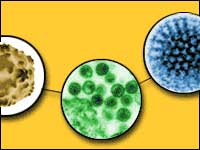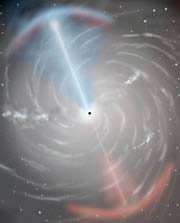
The viruses that cause diseases as varied as AIDS, hepatitis and West Nile Virus may actually have more in common than was previously thought, new research reveals. According to a study that will appear in the March issue of the journal Molecular Cell, three major groups of viruses use similar mechanisms to replicate their genetic information after they have infiltrated the cells of a host.
There are six broad classes of viruses, each thought to represent a major evolutionary lineage. M

The absence of a key signaling protein in the brain during infancy could lead to anxiety disorders later in life, scientists say. According to findings published today in the journal Nature, mice lacking the receptor protein for the chemical messenger serotonin just after birth exhibit abnormal anxiety as adults.
Researchers have known for some time that mice genetically engineered to lack the receptor for serotonin, a neurotransmitter, show anxiety-like behavior. But the new results go one

In recent years, new food packaging concepts have been developed to respond on consumption trends towards mildly preserved, fresh convenient food products. Fresh-cut vegetables are an example of fresh-like, healthy convenience foods, developed in the ‘80s in the UK. Their market is yearly increasing with 25% in West Europe.
Packaging fresh-cut vegetables under an Equilibrium Modified Atmosphere (EMA) is one of the new applied food packaging technologies offering a prolonged shelf-life of re

Footprints and a fire found from 20,000 years ago.
Handprints and footprints 20,000 years old reveal that people lived on the Tibetan plateau at the height of the Ice Age – 16,000 years earlier than scientists had thought. The newly found signs of life cast doubt on the idea that a glacier a kilometre thick covered the plateau at that time.
David Zhang and S. H. Li of the University of Hong Kong found the marks of at least six individuals, including two children, in marble-l

Biotech bugs turn indigo blue in a green way.
Jeans dyed blue by bacteria may soon be swaggering down the streets. Researchers have genetically modified bugs to churn out the indigo pigment used to stain denim. The process could be a greener rival to chemical indigo production.
Originally extracted from plants, indigo dye is now made from coal or oil, with potentially toxic by-products. Bacteria have previously been adapted as alternative indigo manufacturers, but a trace by-

Astronomers shoot first film of the stars, dust and gas at the centre of a galaxy.
Astronomers have made their first movie of the roiling mass of stars, dust and gas at the centre of a galaxy.
The movie zooms into the disk of saucer-shaped galaxy NGC 1068 and through its super-bright core. It reveals an energetic region of space created by material flying out of the suspected black hole at the centre and crashing back into the disk. This region appears as a pale blue cloud

– new calculation confirms standard model of particle physics. Contribution of hadronic vacuum polarization determined with unprecedented accuracy. The magnetic moment of the muon is an important precision parameter for…
Technique may prevent formation of unwanted waves that siphon off needed energy. Heating plasma to the ultra-high temperatures needed for fusion reactions requires more than turning the dial on a…

An international team of astronomers, led by researchers from the Astronomical Observatory of the University of Warsaw, have identified a new class of cosmic X-ray sources. The findings have been…

How deubiquitinases USP53 and USP54 cleave long polyubiquitin chains and how the former is linked to liver disease in children. Deubiquitinases (DUBs) are enzymes used by cells to trim protein…

Conceptual blueprint to analyze experimental catalyst data. Machine learning (ML) models have recently become popular in the field of heterogeneous catalyst design. The inherent complexity of the interactions between catalyst…

Antibody that Neutralizes Inhibitory Factors Involved in Nerve Regeneration Leads to Enhanced Motor Function after Acute Spinal Cord Injury. Researchers at 13 clinics in Germany, Switzerland, the Czech Republic and…

How simulations help manufacturing of modern displays. Modern materials must be recyclable and sustainable. Consumer electronics is no exception, with organic light-emitting diodes (OLEDs) taking over modern televisions and portable…

“Neurons that fire together, wire together” describes the neural plasticity seen in human brains, but neurons grown in a dish don’t seem to follow these rules. Neurons that are cultured…

The quest for sustainable energy solutions has been a major focus of scientific research for decades. Solar energy, a clean and renewable source, has emerged as a promising alternative to…

With a processing speed a billion times faster than nature, chip-based laser neuron could help advance AI tasks such as pattern recognition and sequence prediction. Researchers have developed a laser-based…

New technology could remotely identify various types of plastics, offering a valuable tool for future monitoring and analysis of oceanic plastic pollution. Researchers have developed a new hyperspectral Raman imaging…

Artificial Intelligence (AI) has established a strong presence across industries, large and small. The “VoBaKI” research project has empowered small and medium-sized enterprises (SMEs) with an innovative tool to independently…